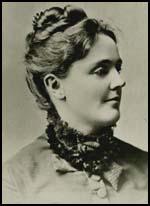Sarah Orne Jewett

Sarah Orne Jewett, the daughter of a doctor, was born in South Berwick, Maine, on 3rd September, 1849. Jewett was educated at Miss Olive Rayne's school and then at Berwick Academy, graduating in 1865.
Jewett had a story published in the Atlantic Monthly at the age of nineteen. This was followed by several books including Deephaven (1877) Play Day Stories (1878) and Old Friends and New (1879).
Sarah became close friends with Annie Fields. Her husband, James Thomas Fields died on 24th April, 1881. Soon afterwards Sarah moved in with Annie. Mark DeWolfe Howe has argued in Memories of a Hostess (1922): "James Fields chose Jewett as the ideal friend to fill the impending gap in the life of his wife. He must have known that, when the time should come for readjusting herself to life without him, she would need something more than random contacts with friends ... He must have realized that the intensely personal element in her nature would require an outlet through an intensely personal devotion. If he could have foreseen the relation that grew up between Mrs. Fields and Miss Jewett her junior by about fifteen years almost immediately upon his death, and continued throughout the life of the younger friend, he would surely have felt a great security of satisfaction in what was yet to be."
When the women were apart they wrote passionate letters to each other. In March 1882, Sarah wrote: "Are you sure you know how much I love you... I think of you and think of you and I am always reminded of you." In another letter she told Annie: "I long to see you and say all sorts of foolish things... and to kiss you ever so many times." Lillian Faderman, the author of Surpassing the Love of Men (1981) openly suggest that Fields and Jewett's relationship was lesbian. However, others have raised doubts about this.
In 1884 George Washington Cable visited their home: "In Charles Street I dined and spent the evening with Mrs. Fields and Miss Sarah Orne Jewett. They are both women of emphatic goodness and intelligence. Mrs. Fields could not see me for some time as she had just come in from a hard day's work of visiting her various charities and was bedraggled by the storm. we talked of men and things... It helps anecdotes, to hear them from a lovely woman of mind & heart & good works & fame, and golden years, and black hair waving down from the centre of the upper forehead & backward to the ears. I must try to get her picture... Miss Jewett is not picturesque, like Mrs Fields, but it's a sweet short sermon just to look at her."
Jewett published A Country Doctor (1884), The Mate of the Daylight and Friends Ashore (1884), A White Heron (1886), Tales of New England (1890), Strangers and Wayfarers (1890), The Country of the Pointed Firs (1896) and The Tory Lover (1901). The critic, William Dean Howells, observed that she had "an uncommon feeling for talk - I hear your people."
Jewett, like Annie Fields, was a strong supporter of women's rights. She once said: "God would not give us the same talent if what were right for men were wrong for women." On another occasion she commented: "What has made this nation great? Not its heroes but its households."
In 1902 Jewett was thrown from a carriage and injured her head and neck. The injuries caused her recurring pain, dizziness, and forgetfulness over the next four years. As Susan K. Harris, the author of The Cultural Work of the Late Nineteenth-Century Hostess (2004), has pointed out: "While Jewett was recuperating in Maine, Fields suffered a mild stroke in Boston; the result of both their illnesses was a prolonged separation and resultant anxiety about each other."
Sarah Orne Jewett died on 24th June, 1909.
Primary Sources
(1) Susan K. Harris, The Cultural Work of the Late Nineteenth-Century Hostess (2004)
After James T. Fields's death in 1881, Annie Fields and Sarah Orne Jewett very quickly became a couple in the New England landscape. Opinions about this relationship vary. For their contemporaries, it seems to have been regarded as a fortunate solution to potential loneliness for both women; this is especially evident in condolence letters written to Fields on Jewett's death in 1909... Mark DeWolfe Howe, whose Memories of a Hostess (1922) constructed the image of Annie Fields for most twentieth-century readers, suggests that James Fields engineered the relationship when he realized he was about to die. Read retrospectively, Howe's construal of James Fields's part in Annie Fields and Jewett's friendship makes the role seem paternalistic, but I suspect Howe's framing was a deliberately ingenuous way of negotiating the facts of the relationship and the growing homophobia of his own era. It would be many years before Lillian Faderman (Surpassing the Love of Men, 1981) would openly suggest that Fields and Jewett's relationship was lesbian. Among recent commentators, Rita Gollin remarks that their "deeply affectionate association resists labeling," and Paula Blanchard treats it as a mutually sustaininb, sororal/maternal friendship between equals.
(2) Mark DeWolfe Howe, Memories of a Hostess (1922)
James Fields chose Jewett as the ideal friend to fill the impending gap in the life of his wife. He must have known that, when the time should come for readjusting herself to life without him, she would need something more than random contacts with friends ... He must have realized that the intensely personal element in her nature would require an outlet through an intensely personal devotion. If he could have foreseen the relation that grew up between Mrs. Fields and Miss Jewett her junior by about fifteen years almost immediately upon his death, and continued throughout the life of the younger friend, he would surely have felt a great security of satisfaction in what was yet to be.
